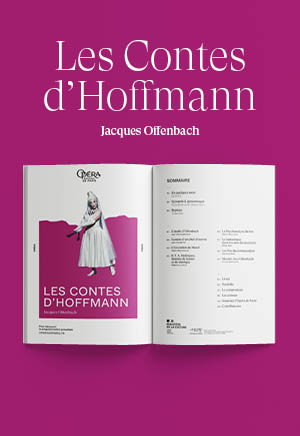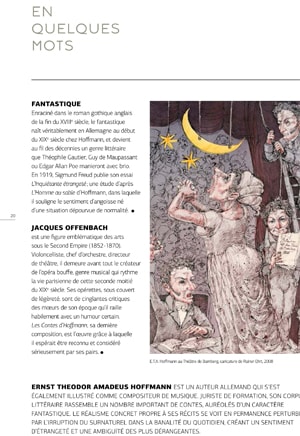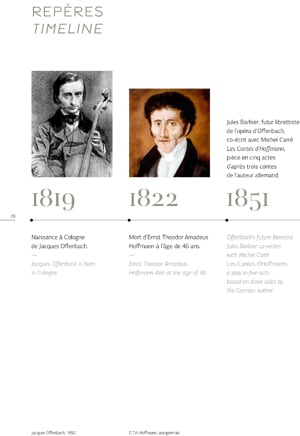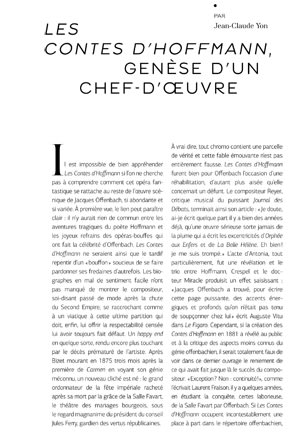Synopsis
Listen to the synopsis
In a tavern, the poet Hoffmann, who has just heard the diva Stella sing, tells the story of the three women he has loved: Olympia, Antonia and Giulietta, three loves thwarted by an evil spirit, Lindorf. Will his passion for Stella suffer the same fate? With this fantastic opera, drawing on the imagination of the writer E.T.A. Hoffmann, Jacques Offenbach sought to prove that he was more than a composer of lightweight works. Even though it remained unfinished after his death in 1880, the score constitutes a magnificent swan song and abounds with famous passages such as the Barcarolle and the Doll Song. Robert Carsen, always fond of portraying theatre within theatre, plunges the audience into the world of an opera house, from the stage to the wings, as his dizzying mise en abyme questions the notions of the anti-hero and the female ideal.
Duration : 3h30 with 2 intervals
Language : French
Surtitle : French / English
Artists
"Opéra fantastique" in a prologue, three acts and an epilogue (1881)
After Jules Barbier, Michel Carré
In French
Creative team
Cast
Paris Opera Orchestra and Chorus
France musique will broadcast Les Contes d'Hoffmann on Saturday January 20 in Judith Chaine's Samedi à l'Opéra.
Media
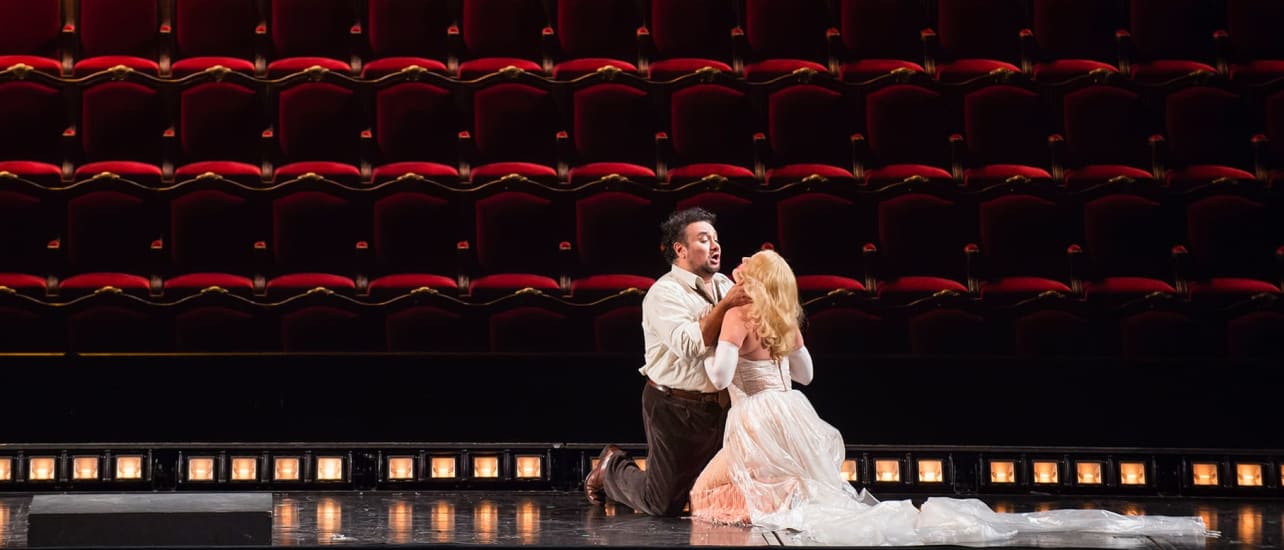

Watch online the recording from season 16/17 on Paris Opera Play, with Ramón Vargas, Nadine Koutcher, Kate Aldrich, Ermonela Jaho, Stéphanie d'Oustrac...
Access and services
Opéra Bastille
Place de la Bastille
75012 Paris
Public transport
Underground Bastille (lignes 1, 5 et 8), Gare de Lyon (RER)
Bus 29, 69, 76, 86, 87, 91, N01, N02, N11, N16
Calculate my route-
Cloakrooms
Free cloakrooms are at your disposal. The comprehensive list of prohibited items is available here.
-
Bars
Reservation of drinks and light refreshments for the intervals is possible online up to 24 hours prior to your visit, or at the bars before each performance.
-
Parking
You can park your car at the Q-Park Opéra Bastille. It is located at 34 rue de Lyon, 75012 Paris.
In both our venues, discounted tickets are sold at the box offices from 30 minutes before the show:
- €35 tickets for under-28s, unemployed people (with documentary proof less than 3 months old) and senior citizens over 65 with non-taxable income (proof of tax exemption for the current year required)
- €70 tickets for senior citizens over 65
Get samples of the operas and ballets at the Paris Opera gift shops: programmes, books, recordings, and also stationery, jewellery, shirts, homeware and honey from Paris Opera.
Opéra Bastille
- Open 1h before performances and until performances end
- Get in from within the theatre’s public areas
- For more information: +33 1 40 01 17 82
Online
Opéra Bastille
Place de la Bastille
75012 Paris
Public transport
Underground Bastille (lignes 1, 5 et 8), Gare de Lyon (RER)
Bus 29, 69, 76, 86, 87, 91, N01, N02, N11, N16
Calculate my route-
Cloakrooms
Free cloakrooms are at your disposal. The comprehensive list of prohibited items is available here.
-
Bars
Reservation of drinks and light refreshments for the intervals is possible online up to 24 hours prior to your visit, or at the bars before each performance.
-
Parking
You can park your car at the Q-Park Opéra Bastille. It is located at 34 rue de Lyon, 75012 Paris.
In both our venues, discounted tickets are sold at the box offices from 30 minutes before the show:
- €35 tickets for under-28s, unemployed people (with documentary proof less than 3 months old) and senior citizens over 65 with non-taxable income (proof of tax exemption for the current year required)
- €70 tickets for senior citizens over 65
Get samples of the operas and ballets at the Paris Opera gift shops: programmes, books, recordings, and also stationery, jewellery, shirts, homeware and honey from Paris Opera.
Opéra Bastille
- Open 1h before performances and until performances end
- Get in from within the theatre’s public areas
- For more information: +33 1 40 01 17 82
Online

Discover opera and ballet in another way

Dive into the Opera world and get insights on opera and pop culture or ballet and cinema. Scan this code to access all the quiz and blindtests on your mobile.

3 min
Les Contes d'Hoffmann
The Tales of Hoffmann: the true/false story
Poor Hoffmann is one disappointment after another... Can you sort out the real from the fake? It's up to you!
DiscoverYou will also like
Partners
-
Timepiece of the Paris Opera























































